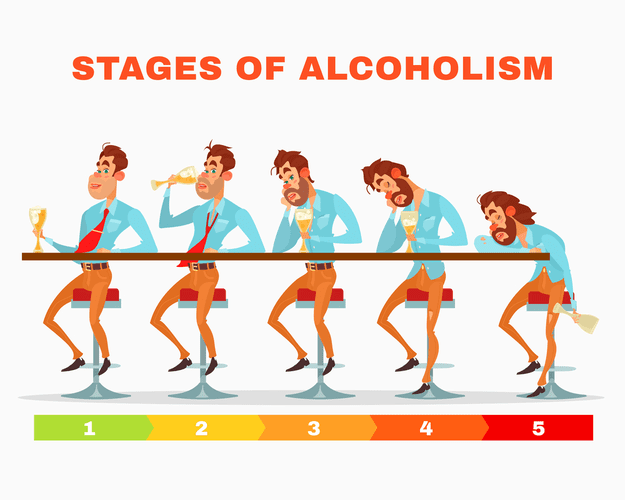The Plan is intended to be an inclusive, government-wide approach that leverages the breadth of federal resources — within https://last24.info/read/2008/02/01/1/126 existing authority for steady-state use — in a synchronized manner to equitably achieve enhanced resilience. As part of the Consortium on Addiction Recovery Science, two HEAL-funded research teams are laying the groundwork for current and future science-based community participation in recovery research. Get the latest announcements on SAMHSA’s effort to address recovery support. Copyright © 2024, AddictionHelp.com The information provided by AddictionHelp.com is not a substitute for professional medical advice. View our editorial content guidelines to learn how we create helpful content with integrity and compassion.
How to Stay Sober
This network typically includes family, friends, sponsors, and support groups. These individuals can provide emotional support, guidance, encouragement, and a sense of belonging, essential for maintaining long-term sobriety. Building and maintaining healthy relationships with people who understand the challenges of recovery can serve as a safety net during times of vulnerability. Regular communication with your support network can be particularly helpful, as it fosters a sense of accountability and provides a space to share concerns, successes, and setbacks.
- Some of the recovery organizations Unick and Tuten are working with are operations that are using sophisticated methods for data collection and using that evidence to influence practice, citing as one example Mosaic Community Services.
- Each month, participants also receive a personalized voice message from a counselor, which includes comments on progress and suggestions.
- Viewing relapse as an opportunity for growth rather than failure increases your chances of long-term recovery.
- While the Federal Plan for ELTRR is presented on odphp.health.gov, it is inclusive of health and non-health sectors and was developed by a large Interagency Workgroup made up of representatives from across the federal government.
- Having additional health concerns—either physical or mental health—while navigating recovery can feel daunting.
Recovery Community Centers
- Rates of abstinence from “all alcohol and other drugs” increased from 20 percent during the 90 days before enrolling to 56 percent since enrolling.
- It’s not just your drinking buddies and drug dealers who can get you into trouble—sometimes those who are closest to you can contribute to a relapse.
- There is hard data showing that the changes to the brain’s neurotransmitters and neural circuits that turn repeated substance use into addiction can be reversed after cessation of drug use, even in the case of addiction to methamphetamine.
- Many people believe that they are powerless to change their own addictive behavior, and often it is a belief that keeps people addicted.
• Developing a detailed relapse prevention plan and keeping it in a convenient place for quick access when cravings hit, which helps guard against relapse in the future. A good relapse prevention plan specifies a person’s triggers for drug use, lists several coping skills to deploy, and lists people to call on for immediate support, along with their contact information. Nevertheless, experts see relapse as an opportunity to learn from the experience about personal vulnerabilities and triggers, to develop a detailed relapse prevention plan, and to step up treatment and support activities. What is needed is any type of care or program that facilitates not merely a drug-free life but the pursuit of new goals and new relationships. There are many roads to recovery, and needs vary from individual to the next. Some people need medication to help them recover, some need the structured support of an outpatient program of a treatment facility to help them through, others need a recovery residence, while others get sufficient information and nourishment from the regular contact with others that self-help groups provide.
Top 9 Strategies for Staying in Recovery
Meanwhile those with more financial resources or milder forms of addiction often heal faster. He was also able to convince his insurance company to pay for longer-term treatment. Similarly, the roughly 95,000 deaths each year in the U.S. attributed to alcohol represent a fraction of high-risk drinkers. But in a pattern researchers say is common, Mable-Jones’ illness eventually eased. She found treatment that worked and has lived drug-free for more than 20 years.
- The motivational force of new goals eventually helps rewire the brain so that it has alternatives to the drive for drugs.
- If certain social settings are triggers, they can limit their exposure or develop strategies to navigate these environments safely.
- Addiction can cause alterations in the regions of the brain involved in executive functioning, such as decision making and self-regulation, leading to difficulty maintaining sobriety despite motivation to change.
- However, of that 29 million, 20.9 million Americans report that they are in recovery.
Adaptive Treatment and Continuing Care

Put simply, these projects will benefit communities grappling with opioid misuse and overdose and other substance use disorders by rapidly advancing research aimed at providing effective recovery support services to people who need them. During the recovery journey, there may be moments of crisis or extreme vulnerability when immediate support is crucial. Creating an emergency contact list is a practical step in these situations. This list typically includes trusted individuals, such as close friends, family members, sponsors, or therapists, who can offer assistance, guidance, or a listening ear when needed. The list should be easily accessible, ensuring that help is just a call or message away during challenging times. A readily http://www.fantastika3000.ru/node/15801 available support system can make the difference between maintaining sobriety and succumbing to relapse.
After the healing, a better life

Evidence-based addiction treatment has started to shift away from short-term treatment to a model of sustained recovery management. Substance disorders are now recognized as chronic conditions that require a long-term process of recovery outside of a formal treatment episode. Recovery management services are designed to provide formalized support that promotes recovery and well-being for a client while they begin to reengage in their lives. This helps an individual to return to work and productive engagement while offering the accountability and support that is necessary for early recovery.
How do behavioral therapies treat drug addiction?
Continue learning new things about yourself and dedicate time to personal growth. While your support https://www.cool-ticket.info/CubaTrips/cuba-music system can help nudge you in the right direction, you are ultimately responsible for preventing relapse. Hold yourself accountable by writing out your goals and tracking your progress. Be sure to nurture these healthy relationships, as they are the first defense against addiction. Research also suggests that participating in support groups (like Alcoholics Anonymous or SMART Recovery) increases recovery success rates.

What is recovery case management?

An overdose happens when the person uses enough of a drug to produce uncomfortable feelings, life-threatening symptoms, or death. And as much as alcohol misuse may seem to “choose” who it wants and the onus of the battle with alcoholism falls on the shoulders of the individual, it requires support from loved ones and professional treatment to reach long-term sobriety. Not only is addiction relapse common, relapse is not considered a sign of failure. In fact, people in recovery might be better off if the term “relapse” were abandoned altogether and “recurrence” substituted, because it is more consistent with the process and less stigmatizing.
Deixe um comentário